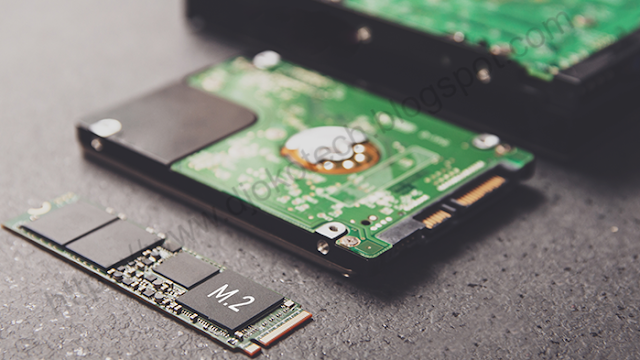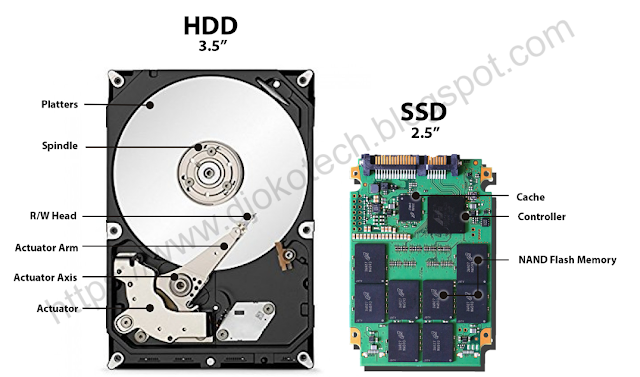Is SSD Hard Drive ? SSD VS HDD Explained
Is SSD Hard Drive ? No, an SSD (Solid State Drive) is not a hard drive. An SSD is a type of storage device that uses flash memory to store data. It is called a "solid state" drive because it has no moving parts, in contrast to a hard drive which stores data on rapidly spinning disks. Because it has no moving parts, an SSD is generally faster and more reliable than a hard drive, and it is also more durable since it is less vulnerable to damage from bumps and drops. However, SSDs are generally more expensive than hard drives, and they generally have less storage capacity for the same price.
What Is SSD?
Solid State Drives (SSDs) are a kind of storage device that use blink memory to store information. Because they have no moving parts, unlike traditional hard drives which store information on quickly rotating disks, They are called "strong specify". This lack of moving parts makes SSDs much faster, more dependable, and more durable compared to hard drives.
Among the main benefits of SSDs is their speed. Because they have no moving parts, information can be accessed almost immediately from an SSD. This makes them a lot much faster compared to hard drives, which need to literally locate the information on the rotating disks. This distinction in speed is especially visible when starting up a computer system or launching applications, which can occur a lot much faster with an SSD.
Along with being much faster, SSDs are also more dependable compared to hard drives. Hard drives are vulnerable to mechanical failings because of their moving parts, and they can also be damaged by bumps or drops. SSDs, on the various other hand, have no moving parts and are therefore much less vulnerable to these kinds of problems. This makes them a more dependable choice for keeping important information.
Another benefit of SSDs is their resilience. Because they have no moving parts, they are much less vulnerable to damage from bumps or drops. This makes them a great choice for laptop computers and various other devices that are often removaled.
Despite these benefits, SSDs do have some disadvantages. Among the main disadvantages is their cost. SSDs are typically more expensive compared to hard drives, and you obtain much less storage capacity for the same price. For instance, a 1 TB hard drive might cost about $50, while a 1 TB SSD might cost $100 or more. This can make SSDs much less attractive for those that need a great deal of storage space on a budget plan.
Another potential disadvantage of SSDs is their limited write endurance. Blink memory can just be contacted a restricted variety of times before it wears out, which means that an SSD will eventually fail. However, most SSDs are designed to last for several years and handle a a great deal of write cycles, so this is typically not an issue for most users.
SSDs are a fast and dependable storage option that offer many benefits over traditional hard drives. They are much faster, more durable, and more dependable, but they are also more expensive and have much less storage capacity. Whether an SSD is right for you'll depend upon your budget and needs.
What Is Hard Drive/Hard Disk?
A hard drive, also known as a hard drive own (HDD), is a kind of storage device that uses quickly rotating disks to recover information and store. It's called a "hard" own because it uses a difficult, rotating surface to store the information, as opposed to a "floppy" own which used a versatile disk.
Hard drives are one of the most common kind of storage device for computer systems, and they are used to store everything from the os and applications to songs, documents, and pictures. Hard drives can range in capacity from a couple of hundred gigabytes to several terabytes, and they are typically affordable, production them a great choice for those that need a great deal of storage space on a budget plan.
Among the main benefits of hard drives is their inexpensive. Because they have been about for as long, the technology is reputable and the cost of manufacturing is reduced. This makes hard drives a great choice for those that need a great deal of storage space but do not want to invest a great deal of money.
Another benefit of hard drives is their high capacity. It's feasible to obtain hard drives with several terabytes of storage space, which is sufficient for most users. This makes hard drives a great choice for those that need to store a large quantity of information.
Despite these benefits, hard drives do have some disadvantages. Among the main disadvantages is their speed. Because information is kept on quickly rotating disks, it takes much longer to access information from a hard drive compared to from an SSD (Strong Specify Own). This can make a computer system feel slower when using a hard drive, especially when starting up or launching applications.
Hard drives are also vulnerable to mechanical failures due to their moving parts. The spinning disks and read/write head are prone to failure, and hard drives can also be damaged by bumps or drops. This makes hard drives less reliable than SSDs, which have no moving parts and are therefore less vulnerable to these types of problems.
Hard drives are a inexpensive storage option that offer a great deal of capacity for the price. They are a great choice for those that need a great deal of storage space on a budget plan, but they are slower and much less dependable compared to SSDs. Whether a hard drive is right for you'll depend upon your budget and needs.
HDD VS SSD : Is SSD A Hard Drive ?
Hard drives (HDD) and Solid State Drive (SSD) are both kinds of storage devices that are used to recover information and store. However, there are some key distinctions in between both that can affect your choice about which one to use.
Among the main distinctions in between HDDs and SSDs is their speed. Because they have no moving parts, SSDs are a lot much faster compared to HDDs. Information can be accessed almost immediately from an SSD, while an HDD needs to literally locate the information on the rotating disks, which takes much longer. This distinction in speed is especially visible when starting up a computer system or launching applications, which can occur a lot much faster with an SSD.
Another distinction in between both is their price and capacity. HDDs are typically less expensive and have a greater capacity compared to SSDs. It's feasible to obtain an HDD with several terabytes of storage space for a fairly low cost, while an SSD with the same capacity will be a lot more expensive. This makes HDDs a great choice for those that need a great deal of storage space on a budget plan, while SSDs are a better choice for those that are ready to pay more for much faster efficiency.
HDDs are also more susceptible to mechanical failings because of their moving parts, while SSDs have no moving parts and are therefore more dependable. HDDs can also be damaged by bumps or drops, while SSDs are more durable in this regard.
To conclude, SSDs are much faster and more dependable compared to HDDs, but they are also more expensive and have a reduced capacity. Whether an HDD or an SSD is the right choice for you'll depend upon your budget and needs. If you need a great deal of storage space and get on a limited budget, an HDD may be the better choice. If speed and dependability are more crucial to you and you're ready to pay more, an SSD may be the better option.



Posting Komentar untuk "Is SSD Hard Drive ? SSD VS HDD Explained"